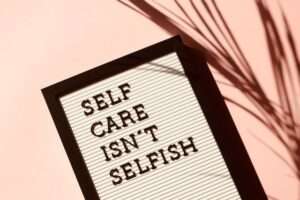Welcome to wikilifestyles.com
Introduction: Self Love
We all want to love and be loved, but we forget one thing when we love others: we forget to love ourselves. After all, who can love us more than our own selves? because no one understands our needs and priorities better than we do
Since it takes less than 4 minutes to read, we respectfully ask that you read the entire article, including the FAQ, without skipping a single sentence. You never know when one of the points could completely alter your life.
what is self-love?
The act of appreciating and caring for oneself is referred to as self-love. It involves nurturing a positive relationship with yourself, accepting and valuing yourself, and putting your well-being first. Self-love is necessary for personal development, happiness, and a fulfilling life.
Self-love does not imply self-interest- interest or disregard for the needs of others. Prioritizing your own needs entails looking after yourself and your well-being in order to be the best version of yourself for those around you.
In fact, practicing self-love can help you become a better and more compassionate person because when you’re happy and fulfilled, you’re better able to help others and make a positive difference in the world.
Here we can go over the eight things we need to know in order to Self Love
1, Be truthful with yourself about your emotions:
To love ourselves, we must first accept and comprehend who we are. Being truthful with ourselves about our feelings and characteristics is a critical step in this process. Being truthful with yourself about your emotions showcases accepting your feelings, even if they are unpleasant or difficult to deal with. It entails being honest about how you feel and accepting that it is normal to experience a wide range of emotions.
Here are some reasons why it is critical, to be honest with yourself about your emotions:
A. Emotional intelligence can be developed by being honest with yourself about your emotions. Emotional intelligence is the ability to recognize, understand, and manage your own emotions as well as the emotions of others.
B. Being honest with yourself about your emotions can help you become more self-aware. When you are aware of your emotions, you can gain a better understanding of your thoughts and behavior and make more conscious decisions that are consistent with your values and goals.
C. Coping with stress: You are better equipped to deal with stress if you are honest with yourself about your emotions. You can take steps to manage your emotions in a healthy way by acknowledging and accepting them, such as through exercise, meditation, or talking to a trusted friend or professional.
D. Relationship improvements: Being honest with yourself about your emotions can also help you build better relationships with others. You can build stronger connections and avoid misunderstandings by understanding your emotions and connecting them clearly.

To sum up, being honest with yourself about your emotions is an important part of developing self-awareness and emotional intelligence. It can assist you in coping with stress, improving relationships, and making better decisions in all aspects of your life.
2. Give that voice your full attention, and listen to yourself:
When we discuss “that voice” in the context of self-love, we usually mean our inner voice or self-talk. This is the inner voice that gives us feedback, opinions, and commentary on our thoughts, actions, and experiences. This voice can be positive and encouraging at times, but it can also be critical and self-defeating.
To practice self-love, give that voice your undivided attention and listen to what it has to say. This is why:
A. Listening to your inner voice increases your awareness of your thoughts and emotions. This can assist you in identifying negative self-talk and self-doubt, which is frequently the first step in changing those patterns.
B. Self-compassion: Listening to your inner voice allows you to better understand and validate your own emotions. This can assist you in practicing self-compassion, which is an essential component of self-love.
C. Self-improvement: Listening to your inner voice can help you identify areas in which you need to improve or change. For instance, if your inner voice tells you that you need to take better care of yourself, you can use that information to create a self-care routine.
D. Self-acceptance: By paying close attention to your inner voice, you demonstrate a willingness to accept and embrace all aspects of yourself, including your flaws and imperfections. This can assist you in cultivating a more positive and accepting relationship with yourself.
In short, paying attention to your inner voice and listening to yourself is an important part of implementing self-love. It can assist you in becoming more aware, nurturing self-compassion, identifying areas for improvement, and fostering self-acceptance.
3. See the best parts of yourself and keep focusing on them:
This term means recognizing and acknowledging the positive qualities and attributes that describe you and making a coordinated effort to nurture and cultivate them.
It is critical to appreciate and value yourself in the context of self-love, including your strengths, skills, accomplishments, and unique qualities. You can cultivate a more positive self-image and develop greater self-confidence by recognizing your own worth and focusing on your strengths.

People frequently focus on their flaws or weaknesses, which can result in negative self-talk and low self-esteem. By focusing on your positive qualities, you can develop a more positive self-image and a stronger sense of self-worth.
This does not imply ignoring or denying your flaws or areas for improvement, but rather not allowing them to define your entire self-image. Recognize your flaws while also acknowledging that they are only a small part of who you are and that you have many positive qualities.
By focusing on the positive aspects of yourself, you can cultivate self-love and acceptance, which can lead to a happier, more fulfilling life.
4. Accept the fact that you are doing your best:
In the context of self-love, this means that you identify and acknowledge that you are trying your hardest and giving your best effort. It’s about being gentle with yourself and not putting unrealistic expectations on yourself.
Many people are too hard on themselves, passing harsh judgment on themselves, and expecting too much from themselves. This can result in a negative self-image, low self-esteem, and a chronic sense of failure.
Accepting that you are doing your best can help you develop a more positive self-image and a stronger sense of self-compassion. It implies accepting that you are human and that making mistakes, facing difficulties, and having limitations are all part of the human experience.

You give yourself permission to make mistakes, learn from them, and grow when you accept that you are doing your best. You also acknowledge your own efforts and accomplishments rather than focusing solely on your flaws.
Self-love involves treating oneself with kindness, understanding, and compassion. Accepting that you are doing your best is an important part of this practice, and it can assist you in developing a healthier and more positive relationship with yourself.
5. Maintain a closed circle of the closest few:
In the context of self-love, maintaining a closed circle of the closest few means being selective and intentional about whom you allow into your inner circle of friends and family. It’s about surrounding yourself with people who encourage, uplift, and support you, as well as people who bring positivity into your life.
When you have a close circle of people around you, you are more likely to feel comfortable and safe being yourself. You can express your feelings, thoughts, and experiences without fear of being judged or rejected. This can help you develop stronger relationships, improve your mental health, and boost your self-esteem.
Allowing toxic or negative people into your inner circle, on the other hand, can be detrimental to your self-esteem and overall well-being. Negative people can sap your energy, erode your confidence, and cause you to doubt yourself. It’s critical to recognize toxic people and limit or cut off contact with them for the sake of your own mental health and self-love.
Overall, keeping a small circle of close friends means being deliberate about whom you choose to surround yourself with and being aware of how they affect your life. You can strengthen your sense of self-love and build a more fulfilling life by choosing to spend time with people who bring positivity and joy into your life.
6. Do not feed your body in response to what others expect of you:
When it comes to your body, it means valuing and prioritizing your own health and well-being over the opinions or expectations of others.
In our society, there is a lot of pressure to conform to certain body standards, which is often reinforced by social media and societal expectations. This stress can result in a negative body image and disordered eating habits.
Rather than succumbing to these pressures, it is critical to practice self-love by tuning into your own body’s needs and feeding it in a way that promotes your physical and mental health. Listening to your hunger cues, choosing nutritious foods that make you feel good, and not restricting or overindulging based on external pressures are all examples of this.
7. Brush up our life from time to time:
If we love ourselves, we need to “brush up” on our lives from time to time so that we can continue to grow, learn, and evolve as individuals. Just as a house or a car requires regular maintenance to stay in good working order, our lives require regular check-ins and assessments to ensure that we are on the right track and on track with our values and goals.
We can identify areas where we may need to make changes, set new goals, and make adjustments to our plans by taking the time to reflect on our lives and assess our progress. This can assist us in remaining motivated, avoiding burnout, and making progress in our personal and professional lives.
Furthermore, taking the time to care for ourselves and our well-being demonstrates self-love and self-respect. It means we value our own growth and development and are making long-term investments in ourselves. This can lead to a greater sense of purpose, fulfilment, and overall happiness in life.
In conclusion, brushing up on our lives on a regular basis is critical for self-love because it allows us to continuously grow and evolve as individuals, as well as ensure that we are aligned with our values and goals. We can cultivate a greater sense of self-respect, happiness, and fulfillment in life by valuing our own growth and development.
8. Push yourself out of your comfort zone:
Pushing yourself outside of your comfort zone is helpful to self-love because it allows you to grow, learn new skills, and develop greater self-confidence and self-esteem.
We tend to stick to familiar routines and habits when we stay within our comfort zone, which can lead to feelings of boredom, stagnation, and complacency. When we challenge ourselves and step outside of our comfort zone, on the other hand, we expose ourselves to new experiences, people, and opportunities that can broaden our perspectives and help us learn and grow.
We can develop better stability and self-confidence by pushing ourselves outside of our comfort zone. We may encounter obstacles or failures along the way when we take risks and try new things, but these experiences can help us build greater resilience and problem-solving skills. Furthermore, when we achieve success in something we previously thought was beyond our abilities, we can gain a greater sense of self-confidence and self-esteem.
Furthermore, pushing ourselves outside of our comfort zone can assist us in overcoming fears and limiting beliefs. When we challenge ourselves to do something we once thought was impossible, we can overcome our fears and doubts and develop a stronger sense of self-efficacy and self-belief.
To summarize, stepping outside of our comfort zone is important for self-love because it allows us to grow, learn, and develop greater self-confidence and self-esteem. We can broaden our horizons, overcome fears and limiting beliefs, and build greater resilience for the future by challenging ourselves.
Conclusion :
Self Love is a necessary component of mental and emotional well-being. This article emphasizes the importance of loving oneself and offers practical tips for cultivating self-love.

This article emphasizes that loving oneself is not selfish, but rather necessary for living a healthy and fulfilling life, this article offers advice on self-care, setting boundaries, learning to say no, embracing imperfections, and practicing positive self-talk.
Finally, this self love blog emphasizes the importance of cultivating self-love and offers practical tips for doing so. Individuals can develop a healthy and loving relationship with themselves by practicing self-care, setting boundaries, learning to say no, embracing imperfections, and practicing positive self-talk. This leads to improved overall well-being and a more fulfilling life.
Please share this article to your loved ones if you feel its informative and do follow our blog site https://wikilifestyles.com
for such useful articles
you can also refer https://psychcentral.com/blog/imperfect/2019/05/what-is-self-love-and-why-is-it-so-important for different article on the same topic
FAQ :
Ques. 1 what is the term ‘its ok when its not ok’ mean ?
The phrase “it’s okay when it’s not okay” can refer to the importance of acknowledging and accepting your emotions, even when they are unpleasant or difficult to deal with.
People may feel pressured to always be happy or positive, and they may feel guilty or ashamed if they experience negative emotions such as sadness, anxiety, or anger. However, this can be harmful to one’s mental and emotional well-being because it can lead to emotional suppression or denial.
“It’s okay to not be okay ” means that it’s important to give yourself the space and support you need to process and heal from difficult emotions.

1 thought on “Self Love”